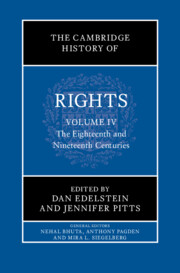Book contents
- the cambridge history of rights
- The Cambridge History of Rights
- The Cambridge History of Rights
- Copyright page
- Contents
- Figures
- Contributors to Volume IV
- General Introduction
- A Note on Translations
- Introduction to Volume IV
- Part I A Revolution in Rights?
- Part II Postrevolutionary Rights
- Part III Rights and Empires
- 18 Rights and Empires
- 19 Rights in Late Mughal and Early Colonial India
- 20 Rights in the Americas
- 21 The Free Sea
- 22 Abolition and Imperialism in Africa
- 23 Rights in Pan-Asian, Pan-Islamic, and Pan-African Thought
- 24 Indigenous Rights in Settler Colonies
- 25 Catholicism and Rights
- 26 (Human) Rights Associations (1775–1898)
- Index
- References
22 - Abolition and Imperialism in Africa
from Part III - Rights and Empires
Published online by Cambridge University Press: 22 January 2025
- the cambridge history of rights
- The Cambridge History of Rights
- The Cambridge History of Rights
- Copyright page
- Contents
- Figures
- Contributors to Volume IV
- General Introduction
- A Note on Translations
- Introduction to Volume IV
- Part I A Revolution in Rights?
- Part II Postrevolutionary Rights
- Part III Rights and Empires
- 18 Rights and Empires
- 19 Rights in Late Mughal and Early Colonial India
- 20 Rights in the Americas
- 21 The Free Sea
- 22 Abolition and Imperialism in Africa
- 23 Rights in Pan-Asian, Pan-Islamic, and Pan-African Thought
- 24 Indigenous Rights in Settler Colonies
- 25 Catholicism and Rights
- 26 (Human) Rights Associations (1775–1898)
- Index
- References
Summary
The rights of man and the citizen were in conflict in West African abolitionism because the universalism of the rights of man was not enforceable without encroaching on the sovereignty of African states. This chapter will explore the development of ideas of rights in the engagements between West Africa and the abolitionists and imperialists who intervened there across the nineteenth century. The three sections explore the forms of civil, political, and ‘universal’ rights that existed in West Africa at the beginning of the nineteenth century; the ideas of rights that abolitionists developed in their antislavery interventions against the slave trade in West Africa; and the ideas of rights that emerged in debates over imperial citizenship in these colonies towards the end of the century. A multiplicity of rights regimes existed in overlapping and competing spaces as West Africa became a site for differentiating the civilizing mission and citizenship; duties and rights; and the boundaries of universal privileges and assertive versus paternalistic rights. The Declaration of the Rights of Man and the Citizen may have laid out the theory for citizenship, law, and universal rights, but it was through the attempt to implement those ideas as universal that differentiation between basic rights and citizenship rights began to be articulated. That differentiation emerged through negotiations over the power to implement universal ideals in places like West Africa, which were undergoing their own revolutions in ideas of universal legal regimes and notions of citizenship, while maintaining political privileges for a subset of the population. In the process, European colonial governments came into conflict with each other and with African governments’ ideas of the universal moral values that conferred rights on their members.
- Type
- Chapter
- Information
- The Cambridge History of Rights , pp. 523 - 543Publisher: Cambridge University PressPrint publication year: 2024

